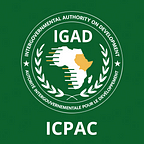IGAD Member States Journalists Unite for Crisis Reporting Training
A collaborative Response to Transboundary Pest Invasion in Eastern Africa
By Emebet A. Jigssa with contributions from the IGAD Climate Change Technical Working Group
In the face of a crisis, the media becomes a powerful tool for communicating life-saving information, fostering unity, and catalyzing collaborative efforts. Eastern Africa faces a significant challenge of transboundary pest invasion. In response, journalists from Intergovernmental Authority on Development (IGAD) member states came together to showcase the effectiveness of joint crisis reporting. This collaborative effort not only highlights the importance of crisis reporting but also emphasizes the significance of training, knowledge sharing, and cooperation with stakeholders, governments, and international organizations.
The Power of Crisis Reporting
Crisis reporting plays a vital role in providing essential and timely information during emergencies. Journalists act as a critical link in educating the public, raising awareness, and mobilizing resources.
In the case of the transboundary pest invasion in Eastern Africa, IGAD member states journalists showcased how their reporting efforts significantly contributed to mitigating the crisis.
According to Getnet Shenkute, crisis reporting on Transboundary Pests in Ethiopia is crucial as it supports the broader food security efforts in the region.
“Crisis reporting on transboundary pests, specifically the desert locust, holds immense significance for Ethiopia given its substantial impact on the IGAD region. Due to Ethiopia’s extensive border connections with neighboring countries faces heightened risk associated with transboundary pest threats,” explained Getnet.
Benefits of Training in Crisis Reporting
Effective crisis reporting requires specialized skills and knowledge. Training programs play a vital role in empowering journalists with the tools necessary to report accurately and responsibly during emergencies. By participating in dedicated training initiatives, journalists from IGAD member states have the opportunity to enhance their understanding of crisis communication, risk assessment, and ethical reporting practices. Such training initiatives ultimately contribute to improving the overall quality of reporting.
These kinds of training sessions and initiatives thrive in integrated regions, fostering a better understanding of diverse traditions, languages, and perspectives.
Cultural exchanges contribute to improved communication and mutual respect among member states. This is particularly true of the IGAD region, where several key non-intelligible languages are spoken. Yet, it is essential that the information disseminated through crisis reporting reaches all the stakeholders along the climate services value chain.
Ibasi Patricia Tobs states that “language use in South Sudan matters because users need understandable information to make decisions.” The exchange of vital information about pest invasions among journalists from IGAD member states becomes even more crucial, as it enables a larger audience to access and understand this important information. she added.
Sharing Knowledge and Information
Collaboration among journalists from different countries fosters the exchange of knowledge and information. By sharing insights and experiences, journalists can gain a broader perspective on the crisis at hand. In the context of the transboundary pest invasion, IGAD member states journalists engaged in knowledge-sharing sessions, enriching their understanding of the pest’s behavior, affected regions, and available resources. This shared knowledge enabled more comprehensive and accurate reporting, providing the public with valuable information on preventive measures and response efforts.
This has had a profound impact on Solomon Muingi, a journalist from Kenya.
“The training is key in helping the media to effectively communicate transboundary pest information and help the end users make the right decision before a crisis happens” he says.
Working with Stakeholders, Government, and international Organizations
Collaboration with stakeholders, governments, and international organizations is crucial for a coordinated crisis response. IGAD member state journalists actively engaged with agricultural experts, local communities, government agencies, and international organizations involved in pest control efforts. By working closely with these stakeholders, journalists can gain access to credible sources of information, enabling them to report authoritatively on the crisis. Moreover, this collaboration facilitates a unified approach, ensuring that accurate information is disseminated, and resources are allocated efficiently.
Kenneth Mwangi, Project Lead and Early Warning Expert from ICPAC explains,
“For the scientists who generate Early Warning Information, it is crucial to undergo crisis reporting alongside journalists. This training helps the scientists understand the best techniques to develop impactful Early Warning information for the different users such as farmers, planners, control actors, and policy makers.
Through this training, the scientists view it as a co-design process where they obtain valuable perspectives on how to provide better customised information to the end users. During the training, journalists offered insightful suggestions on enhancing the impact of early warning through audience mapping, which was practically implemented”, shared Kenneth Mwangi.
Achieving Better Results Through Cooperation
The collective efforts of journalists from IGAD member states, along with various stakeholders, yielded significant outcomes. Their accurate reporting played a crucial role in raising public awareness, motivating communities to adopt preventive measures and support pest control initiatives. Additionally, the timely and precise dissemination of information enabled governments and international organizations to allocate resources effectively, resulting in a more targeted and efficient response.
The transboundary pest invasion in Eastern Africa served as a catalyst for unity among IGAD member states journalists. Through training, knowledge sharing, and collaboration with stakeholders, governments, and international organizations, these journalists exemplified the power of collective crisis reporting. Their efforts not only informed the public but also facilitated a coordinated and effective response to the crisis. As a testament to the impact of collaborative journalism, this initiative stands as a model for future crisis reporting endeavors, emphasizing the importance of working together for the greater good of society.
